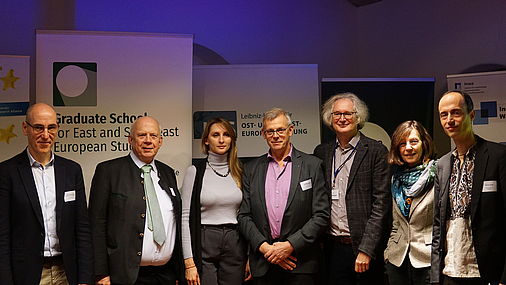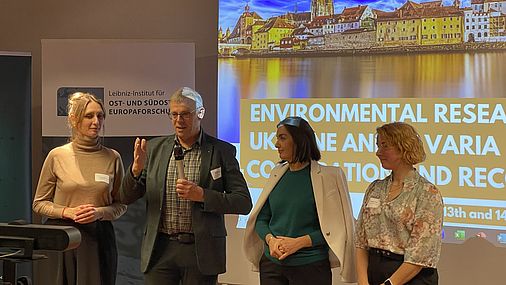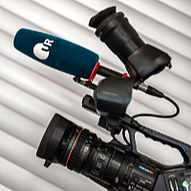Building Back Better Environment Research
University of Regensburg hosts matchmaking conference with participants from Ukraine and Bavaria in the field of interdisciplinary environmental research and its application.
22 November 2023
Since Russia’s large-scale invasion of Ukraine in February 2022, approximately one third of Ukraine's research infrastructure has been destroyed, Ukrainian state research funding has decreased by more than 50%, thousands of scientists have fled abroad while others are fighting on the front line. Academic reconstruction in Ukraine will take years - while at the same time the need for scientific knowledge and university education is increasing. How to deal with this situation? In the field of interdisciplinary environmental research and its application, this was discussed on 13/14 November 2023 in Regensburg at a major international match-making conference with stakeholders from science, state agencies, and non-governmental organizations. During the event, 30 scientists and experts from Bavarian Universities and Universities of Applied Sciences met with 30 Ukrainian colleagues in order to (re-)establish and strengthen corresponding scientific infrastructures and research collaborations.
The conference discussed possible efforts for the future reconstruction of both the academic landscape and the structures of environmental protection in Ukraine. It was jointly organized by the Bavarian Environment Agency, the Bavarian Research Alliance (BayFOR) and the Science at Risk Emergency Office by akno e. V. together with the BAYHOST Coordination Office for Ukraine, the Leibniz Institute for East and Southeast European Studies (IOS), the Graduate School for East and Southeast European Studies, and the City of Regensburg.
Over two days, the participants discussed various topics in five working groups, including challenges of waste management and circular economy; modern hydro melioration service and ecological balance; Natura 2000 (the EU-wide network of protected areas for the conservation of endangered or typical habitats and species) and the Emerald Network (an European ecological network made up of areas of special conservation interest) as tools for conservation and restoration of biodiversity, and green energy and climate sustainability.
Generating transfer and participation
Sending out “a signal for polyphony and new encounters” as UR’s Vice President put it, the two-day conference was addressing a variety of research topics related to environment issues and their impact on human security – in Ukraine and beyond. The conference participants were welcomed at UR’s “Haus der Begegnung” by Volodymyr Pushkar, Network Technology Transfer Water (TTW) of the Bavarian Environment Agency (LfU), Hof, UR’s Vice President for Internationalization and Diversity, Professor Dr. Ursula Regener, Professor Dr. Ulf Brunnbauer, Academic Director of IOS, and the Ukrainian parliamentarian Yuliia Ovchinnikova, member of the Committee on Social Affairs, Health and Sustainable Development of the Parliamentary Assembly of the Council of Europe (PACE).
The conference’s keynote speaker, Professor Sergey Yakubovskiy, head of the Department of World Economy and International Economic Relations at the Odesa I. I. Mechnikov National University, gave insights into the ownership structure and features of Ukraine’s energy market: Besides its monopolistic structures and the lack of independent actors in this sphere, “Ukraine, Europe and the world are facing environmental consequences caused by military warfare”, Yakubovskiy, a long-term IOS partner, said – reminding of the consequences of the bombardment of gas and oil storage facilities, the explosion of the Nord Stream pipeline, or the destruction of the Kakhovka Dam and its hydroelectric power plant.

In charge of the matchmaking conference at UR (from left) Dr. Thomas Ammerl, Prof. Dr. Martin Grambow, Tetiana Folhina, Matthias Worst, Prof. Dr. Ulf Brunnbauer, Prof. Dr. Ursula Regener, and Nikolas Djukic. Credit: Valentin Kordas/IOS
First case study in wastewater treatment
The keynote was followed by two half days of intensive discussions in five working groups. The wrap-ups on the second conference day started with the expert group discussing water management. Dr. Nataliia Kruta (Basin department of water resources of Zakhidnyi Buh and Sian rivers) and Professor Andreas Ottl (OTH Regensburg) informed the plenary about their groups’ ideas regarding the cooperation in the field of wastewater treatment – an issue in which “Ukraine faces the same problems Bavaria had 20 to 30 years ago”. The experts agreed on promoting projects in revitalization of small rivers and wastewater treatment plants, emphasizing their workshop being an excellent starting point: “We are sure we can grow.” The first concrete project will start soon: A case study about a Ukrainian village with less than 5000 inhabitants. Solutions on the wastewater treatment there will be figured out and realized by Ukrainian and Bavarian partners.
Addressing legal and information gaps
A broad spectrum of stakeholders attended the working group discussing challenges of waste management and circular economy. Its findings were presented by Svitlana Slesarenok (Black Sea Women’s Club) and Dr. Thomas Ammerl (BayFOR). Again, Ukraine and Bavaria face similar challenges, when it comes to waste collection in rural areas or information gaps, for instance in the discussion about legislative framework dealing with topics like separate waste collection.
The workshop participants identified possible partners involved in the subject matter area, among them the Cluster of Environmental Technologies Bavaria, the State Agency of Water Resources of Ukraine, the Ukrainian Scientific Center of Ecology of the Sea (UkrSCES), or the Fraunhofer Institute for Building Physics (IBP), as well as certain stakeholders like the Black Sea Women’s Club, the Ukrainian branch of the non-profit organization Women Engage for a Common Future (WECF).
Fostering action for biodiversity
Modern hydro melioration service and achievement of ecological balance was topic in another working group, led by Dr. Hanna Bolbot (Ukrainian Hydrometeorological Institute) and Professor Dr.-Ing. Wolfgang Rieger (Deggendorf Institute of Technology). Ukrainian and Bavarian participants found a variety of common interests and discussed advancing biodiversity modelling tools and forecasts, “always with a focus on climate change impacts”, Bolbot said. The experts are planning to engage intensely in knowledge transfer – starting by sharing documents and tutorials.
This formal exchange is supposed to be followed by the bilateral personal exchange of representatives of different Bavarian agencies or services dealing with topics such as floods, debris clearance, or avalanche forecasts in order to support their Ukrainian colleagues. Within academia, the working group participants want to pursue cooperation lectures and a student exchange, e. g. in the field of rainfall-runoff-modelling. Subsequently, “we need to motivate the actors to apply things and implement a wider strategy”, Rieger said, referring to possible case studies and the possibilities for comparative pilot studies.
Peer-to-peer programs
Dr. Timo Conradi (University of Bayreuth) and Dr. Anna Kuzemko (M. G. Kholodny Institute of Botany of the national Academy of Sciences of Ukraine) presented findings of the working group “Natura 2000 and the Emerald Network as tools for conservation and restoration of biodiversity”. The speakers started their presentation by showing pictures of different habitats of Ukraine: Many of them have been affected by shelling, fire, or floods which have been deteriorating ecosystems and species populations. The experts discussed the assessment of the damage to species and habitats and the possibility of restoration.
They outlined four common objectives: Firstly, they are planning to collect baseline information on pre-war habitats and species. Secondly, they want to develop a categorization of ecological damages and indicators for war impact. The third objective is the assessment of ecological damage based on case studies, e. g. around Kakhovka, or regarding areas affected by military action. Finally, they want to engage in the development of ecological restoration and monitoring strategies. Conradi and Kuzemko emphasized the geographic and thematic scope that was local or Ukrainian. “We speak about species and habitat types of European importance.”
Dr. Rainer Janssen (WIP Renewable Energies) and Professor Oleksandr Sushchenko (Kyiv National Economic University) reflected on the findings of the working group “Green energy and climate sustainability”. The group participants noted that Ukraine’s local communities are affected most by the conflict, water being key: People are facing shortages of drinking water and in agriculture. Their broader topic was the lack of means for projects, within local communities as well as in the field of higher education in Ukraine. They suggested peer-to-peer partner programs for the joint implementation of projects. Furthermore, they want to foster access to educational programs around sustainable development or study programs in renewable energy. The workshop participants would like to see more government-to-government exchange of knowledge, with municipalities being the core element.

Commited to Bavarian-Ukrainian research cooperation (from left):Tetiana Folhina (Science at Risk), Matthias Worst (Bavarian Environment Agency), Yuliia Yevstiunina PhD (Science at Risk), and Antonia Vogl (BAYHOST). Credit: Tanja Wagensohn/UR
Support and structures
Possible ways to contain damage and destruction could be supported by European legislation - and by places and regions working together on the variety of challenging topics. It was of major importance to learn from each other and having experts able to work together in complicated infrastructures, said Professor Dr. Martin Grambow, scientist at the Technical University of Munich and Head of the Water Management and Soil Conservation Department in the Bavarian State Ministry of the Environment and Consumer Protection. Funding opportunities for environmental research in order to initiate new collaborations and joint applications were presented by Dr. Thomas Ammerl, head of the unit “Environment, Energy & Bioeconomy” at BayFOR.
twa.




